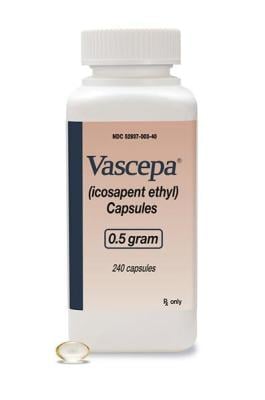
May 24, 2022 — Amarin Corporation plc announced that research on the potential population health impact and cost-effectiveness of VASCEPA (icosapent ethyl), presented in two poster presentations at the American Heart Association’s Quality of Care and Outcomes Research Scientific Sessions in Reston, VA, May 13-14, 2022, showcased significant potential to reduce major cardiovascular (CV) events and associated costs.
The posters explored the potential for icosapent ethyl to prevent atherosclerotic cardiovascular disease-related events and associated costs among 3.6 million1 patients estimated to be eligible for treatment according to REDUCE-IT® trial criteria, and cost-effectiveness of treatment with icosapent ethyl among appropriate adult patients in the United States.
Amarin-supported abstracts to be presented at #QCOR22 included:
- Presentation Title: The Potential Population Health Impact of Treating US Adults with Icosapent Ethyl; Abstract ID#: 244; C.G. Derington, et al, presented on behalf of all authors by Catherine G. Derington, PharmD, MS, University of Utah, Salt Lake City, UT. Publication in the American Journal of Preventive Cardiology. 1
Key Conclusions: If the estimated 3.6 million REDUCE-IT eligible US adults were treated for one year with IPE, 50,000 first and 97,000 total ASCVD events could be prevented. Annually, $3.4 billion from preventing 97,000 total events (first and recurrent) could be saved, resulting in a net burden of $2.6 billion. Annual indirect ($21.6 billion) and outpatient ($23.5 billion) costs in this population are high. If a small proportion (e.g., 5%) of outpatient and indirect costs are prevented with one year of treatment, then IPE is a cost-saving therapy.
- Presentation Title: Cost-Effectiveness of Icosapent Ethyl in Reduce-IT USA: Results from Patients Randomized In The United States; Abstract ID# 170; Z. Zhang, et al, presented on behalf of all authors by Zugui Zhang, PhD, Christiana Care Health System, Newark, DE
Key Conclusions: The REDUCE-IT USA cost-effectiveness analysis has shown that IPE provides better outcomes with lower costs, dominant both in-trial and lifetime as well as in the majority of sensitivity analyses and subgroups, both in primary and secondary prevention. These results, with the clinical evidence of efficacy, suggest that at $4.16 per day, IE therapy should be strongly considered in patients similar to those enrolled in REDUCE-IT USA.
“The AHA has been a powerful voice in calling attention to the increasing health and economic burden on patients and our health systems from inadequately prioritizing and addressing heart disease and related risks,” said Karim Mikhail, Amarin’s president and chief executive officer. “The analyses presented at QCOR reinforce that icosapent ethyl, if prescribed and used consistently to treat eligible patients, can and should be an important tool in helping to reduce the staggering impacts and costs of cardiovascular disease in the U.S.”
For more information: www.vascepa.com
Reference:
1 Derington CG, Bress AP, Herrick JS, Fan W, Wong ND, Andrade KE, Johnson J, Philip S, Abrahamson D, Jiao L, Bhatt DL, Weintraub WS. The Potential Population Health Impact of Treating REDUCE-IT eligible US adults with Icosapent Ethyl. Am J Prev Cardiol 2022 [E-pub ahead of print]. https://doi.org/10.1016/j.ajpc.2022.100345.
Related content:
Research Shows Potential to Reduce Major Cardiovascular (CV) Events
Prescription Omega-3 Pill Did Not Affect Outcome for Non-hospitalized Adults With COVID-19
VIDEO: Icosapent Ethyl Significantly Reduces Coronary Plaque in EVAPORATE Study
Icosapent Ethyl Significantly Reduces Coronary Plaque in EVAPORATE Study


 November 14, 2025
November 14, 2025 









